英语时事阅读现状调查问卷
当前大学生英语阅读现状的调查报告

当前大学生英语阅读现状的调查报告随着全球化的发展,英语在当今社会中的重要性越来越凸显。
本报告旨在调查当前大学生英语阅读的现状,并针对调查结果提出一些建议。
调查方法我们使用了问卷调查的方法,向100名大学生发放了调查问卷,涵盖了他们的英语阅读惯、困难、意愿以及他们在阅读中所遇到的挑战等等方面的问题。
调查结果英语阅读的频率调查结果显示,大多数大学生(70%)表示每周都会进行英语阅读,其中约40%的学生每天都有进行英语阅读。
这表明大学生对英语阅读的重视程度较高。
英语阅读的内容调查结果显示,大部分大学生(80%)更倾向于阅读与他们专业相关的英语材料,这包括学术论文、课外读物和研究报告等。
然而,仅有少数学生对阅读英语小说或新闻感兴趣。
英语阅读的挑战调查结果揭示了大学生在英语阅读过程中所面临的一些挑战。
其中最常见的挑战包括词汇难度的理解(50%)、句子结构的分析(40%)和阅读速度的提升(30%)。
此外,一些学生还提到了对专业术语和文化背景的了解不足的困扰。
建议和解决方案根据调查结果,我们提出以下一些建议,以帮助大学生提高英语阅读的能力:1. 开展词汇训练:学生可以通过阅读英文文章、做词汇练和背诵常用词汇等方式来提升词汇量和理解能力。
2. 研究句子结构和语法:学生可以通过阅读语法书籍、参加语法课程或使用在线语法工具来加强对句子结构的理解。
3. 多样化阅读内容:学生可以尝试阅读不同主题和类型的英语材料,以扩大知识面和提高阅读能力。
4. 参与讨论和交流:学生可以参加英语阅读俱乐部、与同学讨论阅读体验或参加英语角等活动,以提高阅读理解和交流能力。
5. 寻求辅导和指导:学生可以向英语老师或辅导员寻求帮助,以解决阅读中遇到的困难和问题。
结论我们的调查表明,大学生对英语阅读的态度积极,但面临着一些挑战。
通过采取一系列的建议和解决方案,大学生可以提高英语阅读能力。
英语阅读对于他们未来的学习和职业发展将起到重要的促进作用。
小学生英语阅读课情况问卷调查分析报告
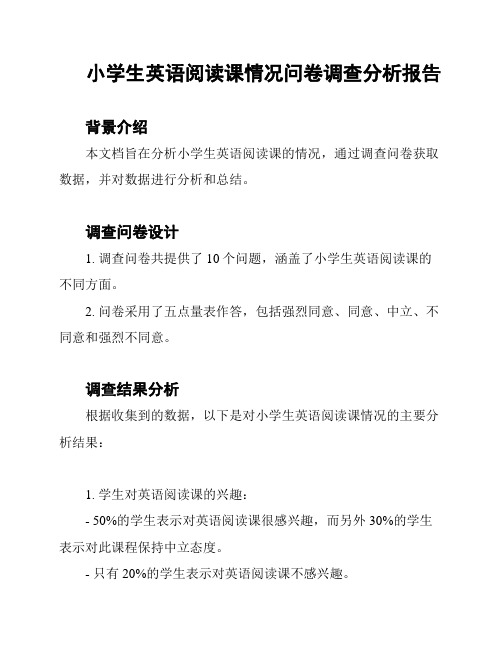
小学生英语阅读课情况问卷调查分析报告背景介绍本文档旨在分析小学生英语阅读课的情况,通过调查问卷获取数据,并对数据进行分析和总结。
调查问卷设计1. 调查问卷共提供了10个问题,涵盖了小学生英语阅读课的不同方面。
2. 问卷采用了五点量表作答,包括强烈同意、同意、中立、不同意和强烈不同意。
调查结果分析根据收集到的数据,以下是对小学生英语阅读课情况的主要分析结果:1. 学生对英语阅读课的兴趣:- 50%的学生表示对英语阅读课很感兴趣,而另外30%的学生表示对此课程保持中立态度。
- 只有20%的学生表示对英语阅读课不感兴趣。
2. 学生对英语阅读课的参与度:- 大多数学生(70%)表示在英语阅读课上积极主动参与。
- 20%的学生只是仅仅参与,表现一般。
- 10%的学生对英语阅读课缺乏兴趣,参与度较低。
3. 学生对教学方法的满意度:- 40%的学生对教师使用的多媒体教学方法表示满意。
- 30%的学生对教师的教学方法持中立态度。
- 另外30%的学生对教学方法不满意,需要改进。
4. 学生对教师的表现评价:- 50%的学生对教师在英语阅读课上的表现比较满意。
- 30%的学生对教师表现持中立态度。
- 20%的学生对教师的表现不满意,认为有待提高。
总结和建议综上所述,大多数小学生对英语阅读课程充满兴趣并且积极参与其中。
教师的教学方法和表现也得到一定程度的认可。
然而,仍有一些学生对课程和教学表现持中立或不满意的态度。
基于以上分析结果,建议以下改进措施以提高英语阅读课的教学质量:1. 教师可以尝试使用更多互动和趣味的教学方法,以激发学生的兴趣和参与度。
2. 加强教师对英语阅读课的准备和教学技巧,确保教学效果达到最佳。
3. 定期收集学生的反馈意见,并在必要时根据学生意见进行调整和改进。
通过以上改进措施的实施,相信可以进一步提升小学生英语阅读课的质量和学生的研究效果。
备注:以上分析结果仅基于调查问卷的数据,具体情况可能因学校、地区和教师的差异而有所不同。
初中生英语阅读课情况问卷调查分析报告
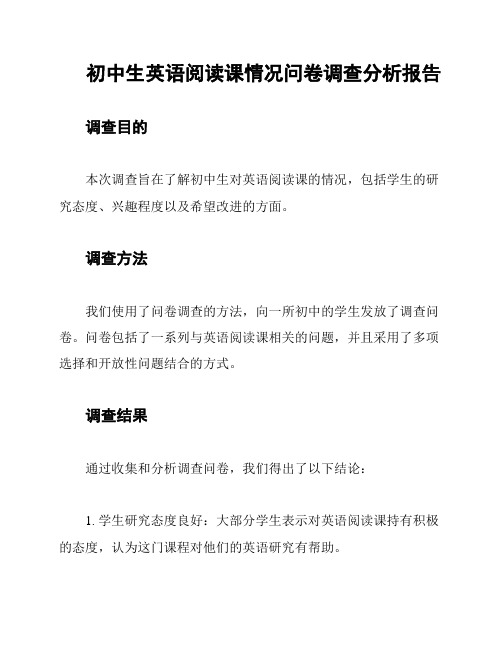
初中生英语阅读课情况问卷调查分析报告调查目的本次调查旨在了解初中生对英语阅读课的情况,包括学生的研究态度、兴趣程度以及希望改进的方面。
调查方法我们使用了问卷调查的方法,向一所初中的学生发放了调查问卷。
问卷包括了一系列与英语阅读课相关的问题,并且采用了多项选择和开放性问题结合的方式。
调查结果通过收集和分析调查问卷,我们得出了以下结论:1. 学生研究态度良好:大部分学生表示对英语阅读课持有积极的态度,认为这门课程对他们的英语研究有帮助。
2. 学生兴趣程度较低:尽管学生对英语阅读课有着积极的态度,但是他们对课程内容的兴趣程度较低。
这可能是因为课程内容和教材选择不够吸引人。
3. 希望改进的方面:学生希望在英语阅读课中增加更多有趣的故事和阅读材料,同时也希望教师能够给予更多的指导和鼓励。
建议和改进措施为了提高初中生英语阅读课的效果,我们提出以下建议和改进措施:1. 丰富课程内容:教师应选择更有趣、生动的故事和阅读材料,以激发学生的阅读兴趣。
2. 提供多样化的教学方法:教师应采用多样化的教学方法,例如小组合作阅读、角色扮演等,以增加学生的参与度和研究动力。
3. 鼓励学生积极参与:教师应给予学生积极的反馈和鼓励,以增强他们的自信心和研究动力。
4. 定期调整教材:根据学生的反馈和需求,教师应定期调整教材内容,以提供与学生兴趣相关的阅读材料。
结论通过本次调查分析,我们认识到初中生英语阅读课中需要改进的方面,并提出了相应的建议和改进措施。
我们相信,通过这些改进,可以提高学生的学习兴趣和阅读能力,进一步促进他们的英语学习和发展。
小学生英语阅读情况调查问卷
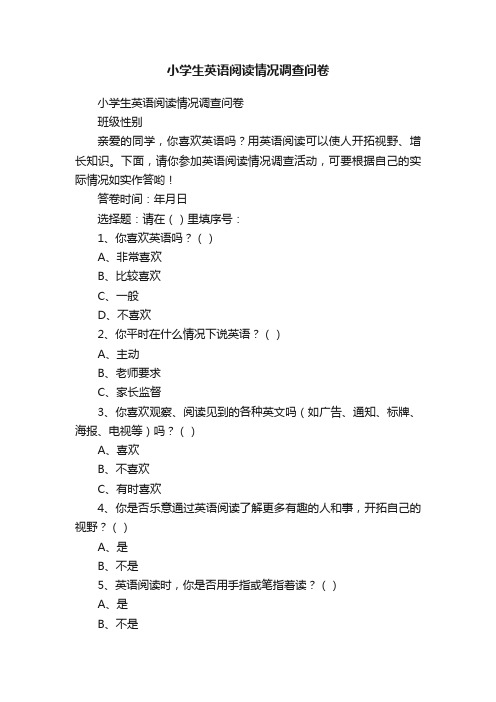
小学生英语阅读情况调查问卷
小学生英语阅读情况调查问卷
班级性别
亲爱的同学,你喜欢英语吗?用英语阅读可以使人开拓视野、增长知识。
下面,请你参加英语阅读情况调查活动,可要根据自己的实际情况如实作答哟!
答卷时间:年月日
选择题:请在()里填序号:
1、你喜欢英语吗?()
A、非常喜欢
B、比较喜欢
C、一般
D、不喜欢
2、你平时在什么情况下说英语?()
A、主动
B、老师要求
C、家长监督
3、你喜欢观察、阅读见到的各种英文吗(如广告、通知、标牌、海报、电视等)吗?()
A、喜欢
B、不喜欢
C、有时喜欢
4、你是否乐意通过英语阅读了解更多有趣的人和事,开拓自己的视野?()
A、是
B、不是
5、英语阅读时,你是否用手指或笔指着读?()
A、是
B、不是
C、有时
6、你是否利用词典等工具书帮助阅读?()
A、能
B、有时能
C、不能
7、你每天是否都有相对固定的时间听英语或者读英语?
A、是
B、不是
C、有时。
小学英语阅读情况调查问卷报告
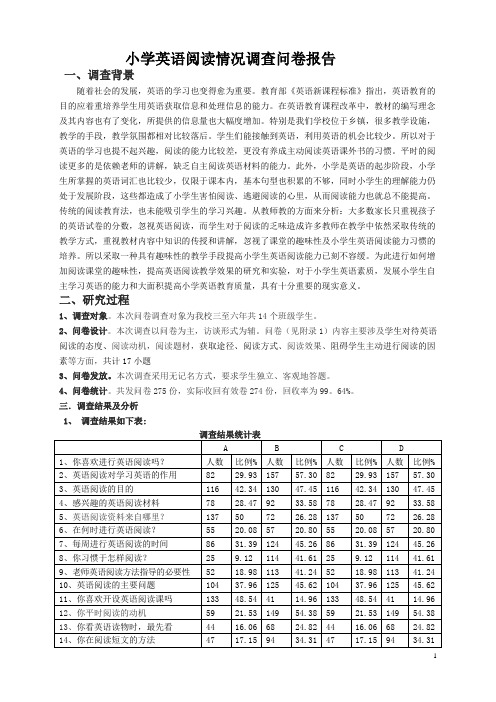
小学英语阅读情况调查问卷报告一、调查背景随着社会的发展,英语的学习也变得愈为重要。
教育部《英语新课程标准》指出,英语教育的目的应着重培养学生用英语获取信息和处理信息的能力。
在英语教育课程改革中,教材的编写理念及其内容也有了变化,所提供的信息量也大幅度增加。
特别是我们学校位于乡镇,很多教学设施,教学的手段,教学氛围都相对比较落后。
学生们能接触到英语,利用英语的机会比较少。
所以对于英语的学习也提不起兴趣,阅读的能力比较差,更没有养成主动阅读英语课外书的习惯。
平时的阅读更多的是依赖老师的讲解,缺乏自主阅读英语材料的能力。
此外,小学是英语的起步阶段,小学生所掌握的英语词汇也比较少,仅限于课本内,基本句型也积累的不够,同时小学生的理解能力仍处于发展阶段,这些都造成了小学生害怕阅读、逃避阅读的心里,从而阅读能力也就总不能提高。
传统的阅读教育法,也未能吸引学生的学习兴趣。
从教师教的方面来分析:大多数家长只重视孩子的英语试卷的分数,忽视英语阅读,而学生对于阅读的乏味造成许多教师在教学中依然采取传统的教学方式,重视教材内容中知识的传授和讲解,忽视了课堂的趣味性及小学生英语阅读能力习惯的培养。
所以采取一种具有趣味性的教学手段提高小学生英语阅读能力已刻不容缓。
为此进行如何增加阅读课堂的趣味性,提高英语阅读教学效果的研究和实验,对于小学生英语素质,发展小学生自主学习英语的能力和大面积提高小学英语教育质量,具有十分重要的现实意义。
二、研究过程1、调查对象。
本次问卷调查对象为我校三至六年共14个班级学生。
2、问卷设计。
本次调查以问卷为主,访谈形式为辅。
问卷(见附录1)内容主要涉及学生对待英语阅读的态度、阅读动机,阅读题材,获取途径、阅读方式、阅读效果、阻碍学生主动进行阅读的因素等方面,共计17小题3、问卷发放。
本次调查采用无记名方式,要求学生独立、客观地答题。
4、问卷统计。
共发问卷275份,实际收回有效卷274份,回收率为99。
初中英语阅读问卷调查
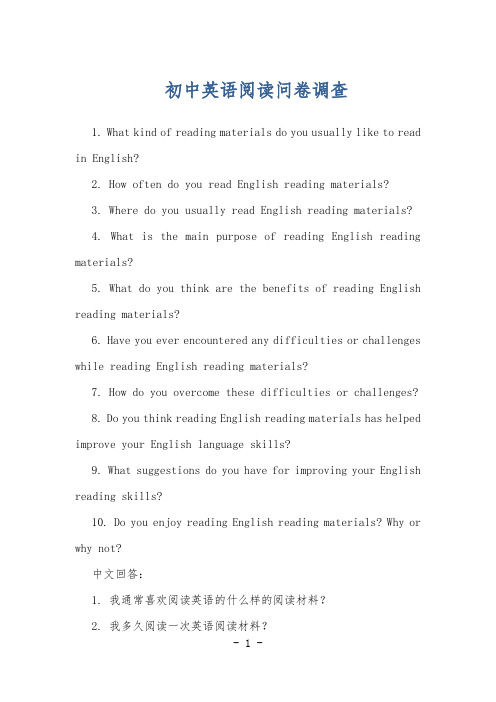
初中英语阅读问卷调查1. What kind of reading materials do you usually like to read in English?2. How often do you read English reading materials?3. Where do you usually read English reading materials?4. What is the main purpose of reading English reading materials?5. What do you think are the benefits of reading English reading materials?6. Have you ever encountered any difficulties or challenges while reading English reading materials?7. How do you overcome these difficulties or challenges?8. Do you think reading English reading materials has helped improve your English language skills?9. What suggestions do you have for improving your English reading skills?10. Do you enjoy reading English reading materials? Why or why not?中文回答:1. 我通常喜欢阅读英语的什么样的阅读材料?2. 我多久阅读一次英语阅读材料?3. 我通常在哪里阅读英语阅读材料?4. 阅读英语阅读材料的主要目的是什么?5. 你认为阅读英语阅读材料有什么好处?6. 在阅读英语阅读材料时,你遇到过什么困难或挑战吗?7. 你是如何克服这些困难或挑战的?8. 你认为阅读英语阅读材料有助于提高你的英语语言能力吗?9. 你对提高英语阅读技巧有什么建议?10. 你喜欢阅读英语阅读材料吗?为什么?。
高中英语阅读现状调查问卷结果及分析
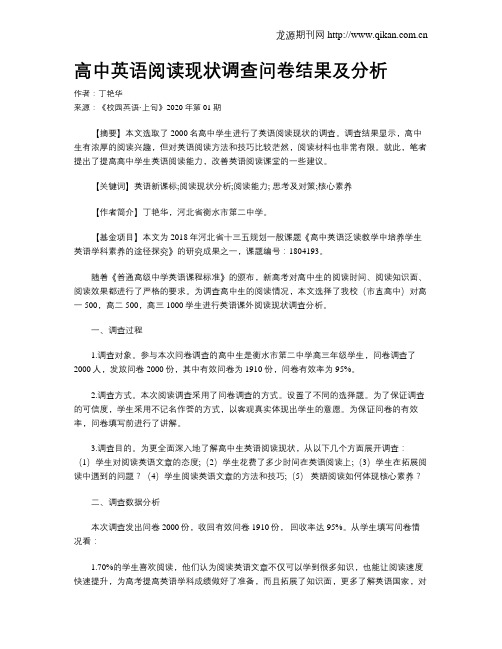
高中英语阅读现状调查问卷结果及分析作者:丁艳华来源:《校园英语·上旬》2020年第01期【摘要】本文选取了2000名高中学生进行了英语阅读现状的调查。
调查结果显示,高中生有浓厚的阅读兴趣,但对英语阅读方法和技巧比较茫然,阅读材料也非常有限。
就此,笔者提出了提高高中学生英语阅读能力,改善英语阅读课堂的一些建议。
【关键词】英语新课标;阅读现状分析;阅读能力; 思考及对策;核心素养【作者简介】丁艳华,河北省衡水市第二中学。
【基金项目】本文为2018年河北省十三五规划一般课题《高中英语泛读教学中培养学生英语学科素养的途径探究》的研究成果之一,课题编号:1804193。
随着《普通高级中学英语课程标准》的颁布,新高考对高中生的阅读时间、阅读知识面、阅读效果都进行了严格的要求。
为调查高中生的阅读情况,本文选择了我校(市直高中)对高一500,高二500,高三1000学生进行英语课外阅读现状调查分析。
一、调查过程1.调查对象。
参与本次问卷调查的高中生是衡水市第二中学高三年级学生,问卷调查了2000人,发放问卷2000份,其中有效问卷为1910 份,问卷有效率为95%。
2.调查方式。
本次阅读调查采用了问卷调查的方式。
设置了不同的选择题。
为了保证调查的可信度,学生采用不记名作答的方式,以客观真实体现出学生的意愿。
为保证问卷的有效率,问卷填写前进行了讲解。
3.调查目的。
为更全面深入地了解高中生英语阅读现状,从以下几个方面展开调查:(1)学生对阅读英语文章的态度;(2)学生花费了多少时间在英语阅读上;(3)学生在拓展阅读中遇到的问题?(4)学生阅读英语文章的方法和技巧;(5)英語阅读如何体现核心素养?二、调查数据分析本次调查发出问卷2000份,收回有效问卷1910份,回收率达95%。
从学生填写问卷情况看:1.70%的学生喜欢阅读,他们认为阅读英语文章不仅可以学到很多知识,也能让阅读速度快速提升,为高考提高英语学科成绩做好了准备,而且拓展了知识面,更多了解英语国家,对阅读能力的提高有很大帮助。
小学生英语阅读情况调查问卷

小学生英语阅读情况问卷调查
亲爱的同学,你喜欢英语吗?喜欢英语阅读吗?请你参加英语阅读情况调查活动,可要根据自己的实际情况如实作答哟!时间:年月日()1、你喜欢英语吗?
A、非常喜欢
B、比较喜欢
C、一般
D、不喜欢
()2、你平时在什么情况下说英语?
A、主动
B、老师要求
C、家长监督
()3、你喜欢观察、阅读见到的各种英文吗?如:广告、标牌、海报、电视等
A、喜欢
B、不喜欢
C、有时喜欢
()4、你是否想通过英语阅读了解更多有趣的人和事,开拓自己的视野?
A、想
B、不想
()5、英语阅读时,你是否用手指或笔指着读?
A、是
B、不是
C、有时
()6、你是否利用词典等工具书帮助阅读?
A、能
B、有时能
C、不能
()7、你每天是否都有相对固定的时间听英语或者读英语?
A、是
B、不是
C、有时
()8、你喜欢进行英语阅读吗?
A、喜欢
B、不喜欢
C、有时喜欢
()9、英语阅读资料来自哪里?(可多选)
A、报刊
B、一起作业网
C、自购图书()10、喜欢的阅读练习题型(可多选)
A、选择
B、填空
C、判断()11、你希望开设英语阅读课吗?
A、希望
B、不不希望
C、无所谓
()12、你看英语读物时,最先看什么?
A、文章内容
B、文章Note
C、练习题。
学科英语现状调查问卷模板

尊敬的参与者:您好!为了解我国学科英语教学现状,提高英语教学质量,我们特此开展本次调查。
本问卷旨在收集您在学科英语学习、教学和评价等方面的真实意见和建议。
您的宝贵意见将对我国学科英语教学发展起到积极的推动作用。
本问卷采取匿名方式,所有信息仅用于统计分析,请您放心填写。
感谢您的支持与配合!一、基本信息1. 您的性别:(1)男(2)女2. 您的年龄:(1)18岁以下(2)18-25岁(3)26-35岁(4)36-45岁(5)46岁以上3. 您所在地区:(1)一线城市(2)二线城市(3)三线城市(4)四线城市及以下4. 您所在学校类型:(1)小学(2)初中(3)高中(5)其他二、学科英语学习现状5. 您对学科英语学习的兴趣程度如何?(1)非常感兴趣(2)比较感兴趣(3)一般(4)不太感兴趣(5)完全不感兴趣6. 您每周用于学科英语学习的时间是多少?(1)1小时以下(2)1-3小时(3)3-5小时(4)5小时以上7. 您认为以下哪些因素对您的学科英语学习影响较大?(可多选)(1)教师的教学方法(2)教材内容(3)学习环境(4)家庭氛围(5)个人兴趣(6)其他(请注明:______)8. 您在学科英语学习中遇到的主要困难有哪些?(1)词汇量不足(2)语法知识掌握不牢固(3)听力理解能力差(4)口语表达能力不足(5)阅读理解能力差(6)写作能力差(7)其他(请注明:______)三、学科英语教学现状9. 您认为以下哪些教学方法对学科英语教学效果较好?(可多选)(1)课堂讲解(2)小组讨论(3)情景模拟(4)角色扮演(5)任务型教学(6)多媒体教学(7)其他(请注明:______)10. 您认为以下哪些教学手段对学科英语教学效果较好?(可多选)(1)教材内容丰富(2)教学进度适中(3)课堂氛围活跃(4)教师讲解清晰(5)作业布置合理(6)评价方式多样化(7)其他(请注明:______)11. 您认为以下哪些因素对学科英语教学质量影响较大?(可多选)(1)教师的专业素养(2)教学方法(3)教材内容(4)教学资源(5)教学评价(6)其他(请注明:______)四、学科英语评价现状12. 您认为以下哪些评价方式对学科英语学习效果较好?(可多选)(1)平时成绩(2)考试成绩(3)课堂表现(4)作业完成情况(5)学习态度(6)其他(请注明:______)13. 您认为以下哪些评价标准对学科英语学习效果较好?(可多选)(1)语法知识掌握程度(2)词汇量(3)听力理解能力(4)口语表达能力(5)阅读理解能力(6)写作能力(7)其他(请注明:______)14. 您认为以下哪些因素对学科英语评价效果影响较大?(可多选)(1)评价标准。
英语阅读策略元认知意识调查问卷

英语阅读策略元认知意识调查问卷Appendix II英语阅读策略元认知意识调查问卷同学:你好!为了提高同学的英语阅读水平,改进阅读教学,我们设计了下面的问卷。
该问卷试图了解你阅读和学习相关的英语文章时的一些情况,你只需选择符合你个人阅读英语文章时的情况的选项即可。
本调查只用于教学研究,与你的成绩无关。
谢谢你的合作和支持!性别:_______年龄:________班级____________专业____________________1.阅读英语文章时,我会为自己确立阅读目的A.从不B.很少C.有时D.经常E.总是2.阅读英语文章时,我会记笔记以帮助理解A.从不B.很少C.有时D.经常E.总是3.阅读英语文章时,我会用到自己已有的相关的知识A.从不B.很少C.有时D.经常E.总是4.阅读英语文章时,我会首先浏览一遍整个文章A.从不B.很少C.有时D.经常E.总是5.遇到难懂的地方,我会大声读出来以帮助理解A.从不B.很少C.有时D.经常E.总是6.阅读英语文章时,我会对文章内容进行总结A.从不B.很少C.有时D.经常E.总是7.阅读英语文章时,我会评价文章内容和目的是否相符A.从不B.很少C.有时D.经常E.总是8.遇到难懂的地方,我会读得慢一些、仔细些A.从不B.很少C.有时D.经常E.总是9.阅读英语文章时,我会和别人讨论文章内容以便更好地理解A.从不B.很少C.有时D.经常E.总是10.阅读英语文章时,我会首先略读来注意文章的长度、结构等特点A.从不B.很少C.有时D.经常E.总是11.遇到难懂的地方,我会努力把注意力集中在所读内容上A.从不B.很少C.有时D.经常E.总是12.阅读英语文章时,我会在文章的重点词、句下划线以帮助理解A.从不B.很少C.有时D.经常E.总是13.根据不同的阅读要求,我会调整自己的阅读方法、速度A.从不B.很少C.有时D.经常E.总是14.阅读英语文章时,我自己知道要重点阅读哪些内容,忽略哪些内容A.从不B.很少C.有时D.经常E.总是15.阅读英语文章时,我会利用参考资料(比如字典)来帮助理解A.从不B.很少C.有时D.经常E.总是16.遇到难懂的地方,我会特别集中注意力A.从不B.很少C.有时D.经常E.总是17.阅读英语文章时,我会利用文章中的图表、注释等来帮助理解A.从不B.很少C.有时D.经常E.总是18.遇到难懂的地方,我会停下来思考所读内容A.从不B.很少C.有时D.经常E.总是19.阅读英语文章时,我会利用文章的线索帮助理解A.从不B.很少C.有时D.经常E.总是20.阅读英语文章时,我会用自己的话解释所读内容来帮助理解A.从不B.很少C.有时D.经常E.总是21.遇到难懂的地方,我会努力想象所读内容A.从不B.很少C.有时D.经常E.总是22.阅读英语文章时,我会利用斜体、黑体等文章的印刷特点来帮助理解A.从不B.很少C.有时D.经常E.总是23.阅读英语文章时,我会评价性地来阅读分析所读内容A.从不B.很少C.有时D.经常E.总是24.阅读英语文章时,我会反复阅读帮助更好地理解A.从不B.很少C.有时D.经常E.总是25.阅读英语文章时,我会仔细分析文章中有冲突的信息A.从不B.很少C.有时D.经常E.总是26.阅读英语文章时,我会首先预测或猜测文章的意思A.从不B.很少C.有时D.经常E.总是27.遇到难懂的地方,我会重新阅读不理解的地方A.从不B.很少C.有时D.经常E.总是28.阅读英语文章时,我会问自己是否读懂A.从不B.很少C.有时D.经常E.总是29.阅读英语文章时,我会证实我对文章内容的猜测是否正确A.从不B.很少C.有时D.经常E.总是30.遇到不认识的单词、词组,我会根据上下文来猜测词义A.从不B.很少C.有时D.经常E.总是。
英语现状调查问卷题目大全
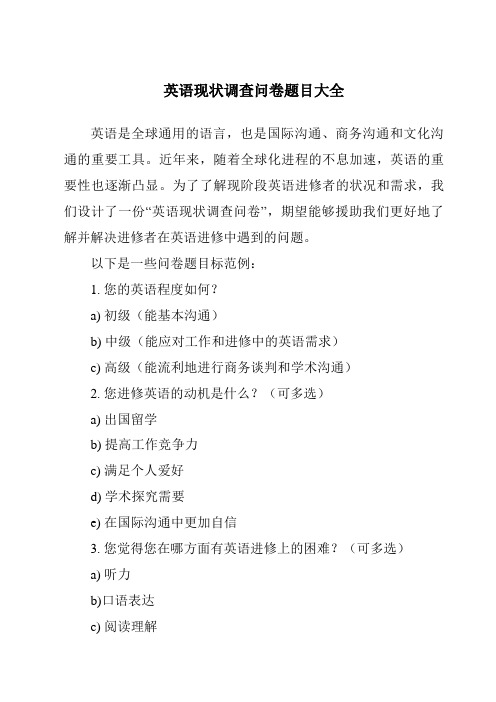
英语现状调查问卷题目大全英语是全球通用的语言,也是国际沟通、商务沟通和文化沟通的重要工具。
近年来,随着全球化进程的不息加速,英语的重要性也逐渐凸显。
为了了解现阶段英语进修者的状况和需求,我们设计了一份“英语现状调查问卷”,期望能够援助我们更好地了解并解决进修者在英语进修中遇到的问题。
以下是一些问卷题目标范例:1. 您的英语程度如何?a) 初级(能基本沟通)b) 中级(能应对工作和进修中的英语需求)c) 高级(能流利地进行商务谈判和学术沟通)2. 您进修英语的动机是什么?(可多选)a) 出国留学b) 提高工作竞争力c) 满足个人爱好d) 学术探究需要e) 在国际沟通中更加自信3. 您觉得您在哪方面有英语进修上的困难?(可多选)a) 听力b)口语表达c) 阅读理解d) 写作能力e) 词汇量积累f) 语法进修4. 您平时是如何进修英语的?(可多选)a) 上英语培训班b) 通过在线进修平台c) 阅读英语原版书籍或文章d) 听英语歌曲或广播e) 进行语言交换f) 通过观看英语电影或剧集5. 您期望英语进修平台具备哪些功能?(可多选)a) 综合英语听说读写能力的训练b) 听力材料的实时字幕c) 可以随时进行语音练习和纠正d) 提供个性化进修规划和教学资源e) 提供在线模考和评估f) 能够与其他进修者沟通和谈论通过这样的问卷调查,我们可以了解到进修者自身的英语水平、动机以及所面临的困难,也能够更加全面地了解他们在进修英语的过程中所期望的功能和服务。
这些信息将有助于我们更好地开发和改进相应的英语进修平台和教学资源,以满足广高校习者的需求,增进英语进修的效果和效率。
同时,我们也将在不同的渠道推广本次问卷调查,以尽量遮盖更多的英语进修者,获得更全面和准确的数据。
通过分析问卷调查结果,我们将能够更好地服务于广高校习者,提高他们的英语进修体验,为他们的个人进步和国际沟通打下坚实的基础。
英语现状调查问卷模板
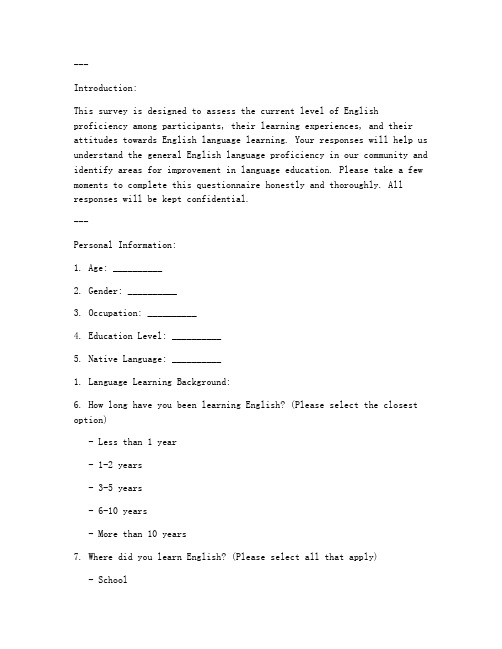
---Introduction:This survey is designed to assess the current level of English proficiency among participants, their learning experiences, and their attitudes towards English language learning. Your responses will help us understand the general English language proficiency in our community and identify areas for improvement in language education. Please take a few moments to complete this questionnaire honestly and thoroughly. All responses will be kept confidential.---Personal Information:1. Age: __________2. Gender: __________3. Occupation: __________4. Education Level: __________5. Native Language: __________1. Language Learning Background:6. How long have you been learning English? (Please select the closest option)- Less than 1 year- 1-2 years- 3-5 years- 6-10 years- More than 10 years7. Where did you learn English? (Please select all that apply)- School- Online courses- Private tutoring- Language exchange programs- Other (please specify): __________8. Have you ever taken an official English proficiency test? (e.g., TOEFL, IELTS, Cambridge English)- Yes- No9. If yes, what was your score? __________2. English Proficiency Assessment:10. Please rate your proficiency in each of the following areas on a scale of 1 to 5, where 1 is 'Not Proficient' and 5 is 'Fluent'.- Listening Comprehension: __________- Reading Comprehension: __________- Writing Skills: __________- Speaking Skills: __________11. Which area do you find most challenging? Why? __________3. Language Use and Exposure:12. How often do you use English in your daily life? (Please select the closest option)- Never- Rarely- Occasionally- Daily13. What are the main contexts in which you use English? (Please select all that apply)- Work- Education- Socializing with friends- Watching movies or TV shows- Reading books or articles- Other (please specify): __________14. How would you describe your exposure to English media? (Please select the closest option)- Very limited- Limited- Moderate- Extensive- Very extensive4. Attitudes and Preferences:15. Do you consider learning English to be important? Why or why not? __________16. What motivates you to learn English? (Please select all that apply)- Career advancement- Academic purposes- Personal interest- Travel- Other (please specify): __________17. If you could change one thing about your English learning experience, what would it be? __________18. What additional resources or support would you like to see inEnglish language learning? __________5. Final Thoughts:19. Is there anything else you would like to add about your English language learning journey? __________Thank You:Your participation in this survey is greatly appreciated. Your insights will contribute to our efforts in enhancing the English languagelearning experience within our community.---Completion Notice:This survey should take approximately 15-20 minutes to complete. Please submit your responses by [insert deadline]. If you have any questions or concerns, please contact [insert contact information]. Thank you againfor。
英语课外阅读调查问卷(推荐5篇)
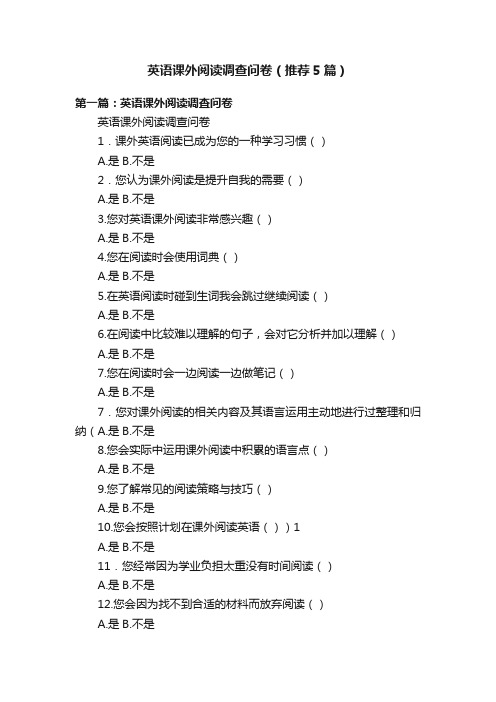
英语课外阅读调查问卷(推荐5篇)第一篇:英语课外阅读调查问卷英语课外阅读调查问卷1.课外英语阅读已成为您的一种学习习惯()A.是B.不是2.您认为课外阅读是提升自我的需要()A.是B.不是3.您对英语课外阅读非常感兴趣()A.是B.不是4.您在阅读时会使用词典()A.是B.不是5.在英语阅读时碰到生词我会跳过继续阅读()A.是B.不是6.在阅读中比较难以理解的句子,会对它分析并加以理解()A.是B.不是7.您在阅读时会一边阅读一边做笔记()A.是B.不是7.您对课外阅读的相关内容及其语言运用主动地进行过整理和归纳(A.是B.不是8.您会实际中运用课外阅读中积累的语言点()A.是B.不是9.您了解常见的阅读策略与技巧()A.是B.不是10.您会按照计划在课外阅读英语())1A.是B.不是11.您经常因为学业负担太重没有时间阅读()A.是B.不是12.您会因为找不到合适的材料而放弃阅读()A.是B.不是13.您认为阅读材料太难,看不懂打击了您课外阅读的积极性?()A.是B.不是14.你认为课外阅读对提高英语阅读能力有很大帮助()A.是B.不是15.您认为课外阅读扩大了你的英语词汇量()A.是B.不是16.您认为课外阅读提高了你的英语写作水平()A.是B.不是您认为课外阅读丰富了你的文化知识()A.是B.不是18.您会针对自己阅读方面存在的主要问题进行过强化训练()A.是B.不是19.您平时阅读的英语读物主要有______。
A.报刊、杂志(如China Daily)B.简易版的英文故事书C.英文原版书著D.网络资源或其他20.您平时读的较多的英语读物类型?【多选题】()A.文学历史(小说、散文、诗歌、史书等)B.人文社科类(历史、政治、哲学等)2C.自然科学类(科普、医疗、地理等)D.休闲时尚(旅游、烹饪、服饰等)E.艺术类(建筑、绘画、影视等)F.人物传记类G.辞典和工具书H.其他21.你是怎么选择课外阅读材料的?()A.随便看B.选自己喜欢的C.听别人推荐的D.选对自己有帮助的22.您阅读的大多数文章的单词数为()A.少于300B.300到500C.500到1000之间23.你对参加英语课外阅读活动的感受:D.1000以上 3第二篇:大学生课外读书情况调查问卷大学生课外读书情况调查问卷亲爱的大学生朋友们,升入大学之后,你们还在读书吗?你们课外有很多时间读书吗?你们还记得读书带来的收获吗?请根据您大学之后的状态,真实回答下列问题,谢谢配合。
英语时事阅读现状调查问卷
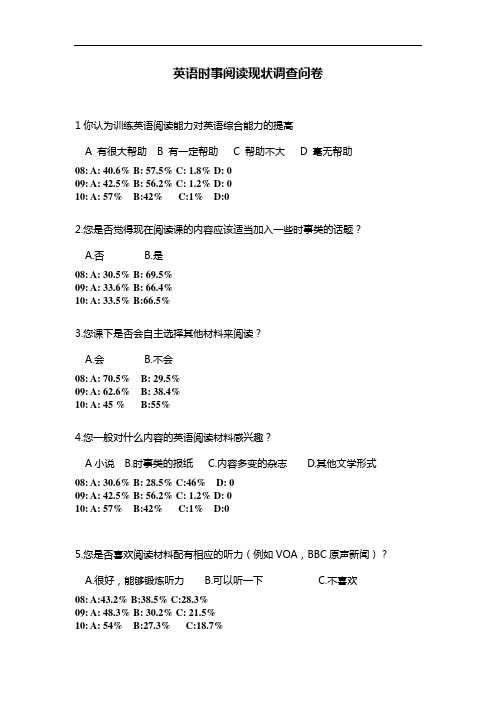
英语时事阅读现状调查问卷1你认为训练英语阅读能力对英语综合能力的提高A 有很大帮助B 有一定帮助C 帮助不大D 毫无帮助08: A: 40.6% B: 57.5% C: 1.8% D: 009: A: 42.5% B: 56.2% C: 1.2% D: 010: A: 57% B:42% C:1% D:02.您是否觉得现在阅读课的内容应该适当加入一些时事类的话题?A.否B.是08: A: 30.5% B: 69.5%09: A: 33.6% B: 66.4%10: A: 33.5% B:66.5%3.您课下是否会自主选择其他材料来阅读?A.会B.不会08: A: 70.5% B: 29.5%09: A: 62.6% B: 38.4%10: A: 45 % B:55%4.您一般对什么内容的英语阅读材料感兴趣?A小说 B.时事类的报纸 C.内容多变的杂志 D.其他文学形式08: A: 30.6% B: 28.5% C:46% D: 009: A: 42.5% B: 56.2% C: 1.2% D: 010: A: 57% B:42% C:1% D:05.您是否喜欢阅读材料配有相应的听力(例如VOA,BBC原声新闻)?A.很好,能够锻炼听力B.可以听一下C.不喜欢08: A:43.2% B:38.5% C:28.3%09: A: 48.3% B: 30.2% C: 21.5%10: A: 54% B:27.3% C:18.7%6.您是否有定期看时事英文报纸的习惯?(频率如何)A.否B.是(a.每天都看 b. 一周一次 c.一月一次 d.几乎不看)08: A: 43.7% B:56.3% (a: 12.4% b:33.8% c:34.2% d:19.6%)09: A: 46.3% B: 53.7% (a: 13.2%b:38% c:29.7% d:19.1%)10: A:53.2 % B:46.8% (a:16.3% b:36.5% c:28.6 d:18.6%)7.下列选项中,您最关注哪一类的时事新闻?(单选)A 政治 B.经济 C.娱乐 D.体育 E.其他08: A: 30.3% B: 20.5% C:24.2% D:14.6% E:10.4%09: A: 32.5% B: 16.2% C: 21.2% D: 18.2% E:11.9%10: A: 32.6% B:20.2% C:16.4% D:18.5 % E:12.3%8.您是否觉得阅读时事类的英文材料对提高英语水平有帮助?A.否B.是(a.能扩充词汇量 b.能增长见识)08: A: 30.6% B: 69.4%09: A: 42.5% B: 57.5%10: A: 38.2% B:61.8%9.您是否觉得有必要开设专门的报刊阅读课?A.没有必要B.有必要08: A: 26.6% B: 73.4%09: A: 33.5% B: 66.5%10: A:27.8% B:72.2%10.您是否在网上浏览英语新闻?A.否B.是08: A: 60.6% B:39.4%09: A: 52.5% B: 47.5%10: A: 57% B:43%11.您是否去过图书馆的报刊杂志阅览室阅览一些英文杂志或报纸?A.否B.是(a.杂志种类较多 b.环境比较好)08: A: 60.6% B: 39.4%09: A: 52.5% B: 47.5%10: A: 57% B:43%12.您觉得在电子阅览室里上阅读课,大家能够就阅读到的新鲜话题用所学英语知识进行讨论,怎么样?A.信息的与时俱进,非常好B.恐怕难以实行,但是赞成C.不赞成,不好管理,而且有些同学可能会利用联网干些与学习没关的事情08: A: 56.6% B: 28.5% C:14.9%09: A: 42.5% B: 36.2% C: 21.3%10: A: 57.2% B:32.5% C:10.3%13、你觉得自己现在的阅读能力A非常好B一般C不好08: A: 10.6% B: 68.5% C:20.9%09: A: 12.5% B: 66.2% C: 21.3%10: A: 17.2% B:62.3% C:20.5%14、目前时事英文阅读你最大的障碍是:A词汇量少B不会合理分配时间C抓不住文章中心08: A: 40.6% B: 20.5% C:38.9%09: A: 42.5% B: 16.2% C: 41.3%10: A: 57% B:22% C:21%15、你目前学习时事阅读的态度是A主动找相关资料阅读B偶尔看看时政热点C从不关心时政热点08: A:40.6% B:54.5% C:4.9% 09: A: 42.5% B: 52.2% C: 5.3% 10: A: 57% B:38% C:5%。
高中英语学生阅读现状问卷调查数据及策略分析

研究高中英语学生阅读现状问卷调查数据及策略分析黄珏摘要:高中阅读教学的目标是通过对文本的阅读掌握基本的语言、文化知识,从而提高学生用英语思维和解决问题的能力;在阅读教学中对学生思维品质的培养是英语学科核心素养的重要组成部分。
但在实际教学中教师们往往把阅读教学程序化地匆匆“过一下”而忽略了阅读教学的真正意义,更谈不上对学生思维品质的培养。
针对这一现状,课题组对本校学生的阅读现状和对思维品质培养的了解情况进行了问卷调查。
在对问卷调查的结果进行分析之后,课题组就如何在高中英语教学中培养学生的思维品质形成了策略。
关键词:高中英语;阅读教学;问卷调查;思维品质培养策略一、学生阅读的习惯和学习方法的调查1.部分学生有较好的阅读习惯:55%的学生在做阅读题是习惯默读并以句群为准;在阅读过程中遇到生词时,35%的学生能根据上下文进行猜测;50%的学生认为提高阅读的主要途径是多背单词、句子和语法;32%的学生能够做到在作业之外另有时看一两篇短文;38%的学生能够使用先看文章,再问题,再看文章,找出答案的解题步骤。
2.部分学生的阅读习惯较差且没有正确的阅读方法:25%的学生阅读中仍然采用不出声,但是心里对每个单词总是念念有词;遇到生词时,21%的学生选择放弃阅读,另外找自己能读懂的文章阅读;没有一个同学选择选项:意识到阅读的重要性,每题通过读报或上网自觉补充至少两篇文章,而且68%的学生课外从来不补充阅读材料,可见学生几乎没有进行课文阅读英语的习惯;在阅读文章的选择上,90%的学生喜欢阅读故事,1.6%的学生喜欢阅读科普文章,而在学生自身看来,70%的学生认为阅读题中丢分最大的是科普类文章。
29%的学生做阅读的步骤是边看文章,边做题。
关于阅读方法,74%的学生认为自己基本能读懂与课文相关的英文文章,但不讲技巧;23%的学生还是通过逐句逐字翻译去理解一篇英文文章。
二、认真研读新课程标准,深刻体会思维品质的内涵和外延,将思维品质的层级和阅读教学目标相结合(一)思维品质的内涵和外延其中逻辑性是思考过程中的规律性,涉及到语言学习中的归纳、推理、判断等认知活动;批判性表现为对事务的反思性和质疑性,涉及到概念或观点的辨析、评价、判断等认知活动;创新性表现为追求不同新颖的事务、善于想象、推陈出新,涉及到语言的建构、生成等认知活动。
英语阅读调查问卷

英语阅读调查问卷1、你觉得英语阅读重要吗?A.非常主要B.主要C.一般D.不主要2、你喜欢英语阅读吗?A.非常喜欢B.还能够C.不太喜欢D.一点儿也不喜欢3、你平时阅读的动机是什么?A.老师要求B.为了扩充课外知识或提高阅读水平C.兴趣D.为了应付考试4、你每天花多少时间在英语课外阅读上?A.不到30分钟B.30分钟C.1个小时D.超过1个小时5、完成200个单词左右的英语文章的阅读量一般花去你多少时间?A.5分钟B.7分钟C.9分钟D.多于9分钟6.你觉得预习对阅读课重要吗?A.主要B.一般主要C.很主要D.不主要E.不知道7、你觉得对你所读的文章有收获吗?A.有B.没有C.不知道D.无所谓8.你对英语老师在阅读方面的教学满意吗?A.很满意B.满意C.一般D.不满意9、你的英语阅读资料通常来自哪里?A.老师给的B.课本上面的C.去书店买的D.英文报上的10、当你阅读时,通常的习惯是A.一边读一边用手指着文字逐词朗读。
B.大声朗读C.不出声,但心里对每个单词总是念念有词D.默读并以句群为准11、当你在阅读过程中遇到生词时,通常是A.马上查词典 B.根据上下文实行猜测 C.问同学D.不管它,继续望下读E.先记下来,继续往下读,有可能呆会就明白了,若不明白,读完再查词典F.记下来,找老师问G.放弃阅读,另找自己能读懂的文章12、你觉得你的英语阅读困难主要在于:A.词汇B.语法C.句式D.文化背景13、影响你阅读的主要原因是A.作业多,没有时间B.没有课外英语材料C.没有兴趣D.看不懂E.没有老师指导14、当前,你提高阅读水平主要途径是:A.老师辅导B.自己多读C.老师辅导加自己多读D.多读多背E.多背单词、句子和语法15、你觉得语感重要吗?A.非常主要B.主要C.一般D.不重要16、你平时遇到有好句子或好文段是否有摘抄的习惯?A.经常摘抄B.偶尔摘抄C.在老师的要求下摘抄D.从不摘抄17、你平时有写读书笔记的习惯吗?A.老师要求就写B.没有C.偶尔写写D.有空就写18.你认为朗读文章有作用吗?A.有 B.非常有 C.没有 D.不知道19、在上阅读课前,你会预习吗?A.会 B.不会 C.偶尔会 D.从不会预习 E.老师要求就会20、你通常是怎样预习阅读课的?A.老师给任务或根据课文后的问题实行B.预习单词C.只是读一读文章D.从不预习,所以不知道怎样预习E.找疑点、难点留待老师讲F.查找有关资料,拓展、延伸有关内容,试着解疑21.平时阅读的情况A.意识到阅读的重要性,每天通过读报或上网自觉补充至少两篇短文B.老师布置的书面阅读作业完成,另有时看一两篇短文C.课外从来不补充阅读材料22、你最喜欢什么类型的英语材料:A故事B科普论文C新闻 D.广告E.说明介绍23.你在阅读短文时会用笔划重点单词,短语或句子吗?A.会B.有时候C.从来不会24.当你碰到难度大的短文时,你会:A.不读B.大概地读,掌握大意C.仔细读,一个一个查字典25.你在阅读文章后能否说出文章的大意?A.能够B.一点点C.不能够26. 阅读策略对提升阅读理解有无协助A. 有协助B. 协助不大C. 没有协助27. 在英语阅.读过程中是否掌握了一定的阅读技巧并且在阅读中加以应用A、不知道有什么阅读技巧,凭感觉B、掌握了一定的阅读技巧,并能应用C、不用什么技巧,多读多练,熟能生巧28. 在英语阅读过程中你能否有意识的选择有效的阅读策略实行阅读:A、能有意识的应用一些阅读策略B、无意识状态下曾应用过阅读策略C、不清楚有何阅读策略29. 阅读过程中词汇障碍表现为:A、生词较多,影响理解文章的主旨及细节B、有生词,不影响理解文章主旨,但影响理解细节C、遇到生词就心烦,失去阅读兴趣和信心30. 阅读过程中你的句法障碍表现为A、遇长句时往往搞不清句子结构,很难理解句意B、遇复合句时容易造成理解偏差,很难理解句意C、各种句法现象(省略、倒装、分隔等)对理解句子结构和句意有较大影响D. 不懂任何句法概念, 就是凭感觉理解31. 阅读理解过程中,语意障碍表现为:A、搞不清上下文之间的语意联系或逻辑关系B、抓不住段落或全篇主旨,在语篇意义理解方面有困难C、只理解表面意义,不理解内涵,难以做出推测和判断32.阅读理解的文体、题材影响较大的为:A、广告、故事类B、新闻类C、科普文、议论文33. 对自己的阅读理解的成绩满意吗?A、不满意B、满意C、怕做英语阅读理解题,每次考试阅读理解失分最多34. 你是否在课外收听或看英语节目,或通过互联网实行英语学习:A、经常性B、偶尔C、没有35. 你觉得母语及其它课外知识对英语阅读理解有何影响?A、有影响,影响很大B、有影响,但影响不大C、无影响。
小学英语阅读能力问卷调查分析

小学英语阅读能力问卷调查分析本文通过调查小学生的英语阅读能力状况,旨在探索有效提高学生阅读能力的方法。
调查发现小学生英语阅读现状不容乐观,主要存在词汇量不足、阅读兴趣缺乏、阅读量不足和缺乏良好阅读方法等问题。
因此,英语阅读教学中,教师应该从积累词汇、提高学生的阅读兴趣、指导阅读方法、培养良好的阅读惯等方面着手,从整体上提高小学生的英语阅读能力,提升小学生的英语素养。
为了研究和改进小学英语阅读教学,本文进行了小学生英语阅读能力的调查和分析。
我们设计了“小学生阅读调查问卷(四、五年级)”来了解学生在积累词汇、提高阅读兴趣、养成阅读惯、确定阅读目的、选择阅读方式和塑造阅读态度等方面的情况。
此外,我们还通过开放性问题了解了影响课外阅读的原因。
调查发现小学生英语阅读现状并不乐观。
主要问题包括词汇量不足、阅读兴趣缺乏、阅读量不足以及缺乏良好的阅读方法。
因此,英语阅读教学中,教师应该从积累词汇、提高学生的阅读兴趣、指导阅读方法、培养良好的阅读惯等方面着手,从整体上提高小学生的英语阅读能力,提升小学生的英语素养。
调查问卷涵盖了多个方面,包括学生如何记住英语单词的汉语意思、记忆单词的方法、如何读懂简单的英语句子、能够认读多少个英语单词以及记忆单词所需的时间等。
通过问卷调查,我们可以更好地了解学生的英语阅读能力和问题所在,从而更好地提供有效的教学方法和指导。
Can you read English texts in your textbook。
Can you understand them completely。
understand a few sentences。
oronly a few words?According to the context。
do you guess the word。
look it up in a nary。
or continue reading without understanding?When you encounter an English text。
how to improve english reading ability
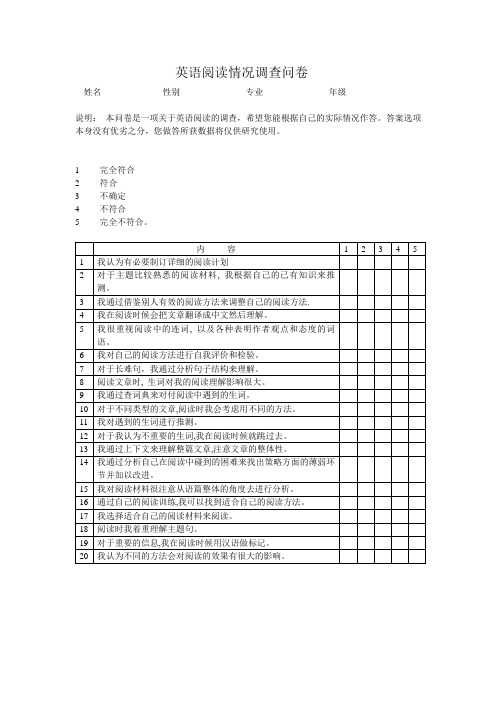
英语阅读情况调查问卷姓名___________ 性别____________ 专业____________ 年级___________说明:本问卷是一项关于英语阅读的调查,希望您能根据自己的实际情况作答。
答案选项本身没有优劣之分,您做答所获数据将仅供研究使用。
1---- 完全符合2---- 符合3---- 不确定4---- 不符合5---- 完全不符合。
摘要:本文就大学生英语阅读调查问卷中存在的问题进行分析。
调查结果表明大学生在英语阅读中存在多方面的障碍, 如词汇、语法、等语言因素及背景知识、阅读习惯、阅读心理等非语言因素。
针这些情况组作了较为深入的分析并提出相应的对策, 以不断提高学生的英语阅读能力。
关键词:英语阅读能力;障碍;对策;意见Abstract: this paper mainly analyzes some reading habits of college students according to my questionnaires which show that there are many obstacles in English reading, such as vocabulary, grammar, as well as nonlinguistic factors, such as background knowledge, reading habits, reading psychology. Accordingly, suggestions are put forward to enhance the students‟ English reading ability.Key words: English reading ability, obstacles, improvement, skimmingOutlineThesis statement: English reading ability, as an essential capacity in our life and study, yet is not grasped well by most of our students, because we are lack of the basic components that include vocabulary, grammar, background knowledge, reading habits, reading psychology etc. As long as we are ready for those, enhancing reading ability is not a problem.I. The significance of reading ability for studentsA.of great urgencyB.influencing the grades of English testsⅡ.Components of English reading comprehensive abilityA.vocabularyB.grammarC.background KnowledgeD.habitsE.psychological qualityⅢ. Effective reading skillsA.Not rapid eye movementB.reading versatilityC.skimmingⅣ. Conclusion: Through the analysis above we should read between the lines so that we get closer to the author and have a better understanding to articles.IntroductionWith the development of society, English reading not only appears in exams but also exists in looking information, getting Info, entertaining or chatting online. English articles are getting more and more, and the range of them is getting wider and wider. English, be the world nowadays international social intercourse language the success that it obtains is an unprecedented in history of. So enhancing English reading comprehension ability becomes utmost urgencyHow to enhance English Reading Comprehension AbilityⅠThe importance of promoting students' reading abilityWith the development of society, English reading not only appears in exams but also exists in looking information, getting Info, entertaining or chatting online. English articles are getting more and more, and the range of them is getting wider and wider. English, be the world nowadays international social intercourse language the success that it obtains is an unprecedented in history of. So improving students' reading ability is of great urgency.The score takes about 40%in the college English test band 4. In a certain extent, doing well or not in the reading comprehension directly influences the grades of English tests. Moreover reading could maintain the interesting of learning English,strengthen knowledge and improve ability and be helpful for students to have a better understanding of the world. We can not study foreign language well without improving the reading ability.ⅡStatus in quo of college students‟ reading ability and the analysis of the obstacles English reading comprehensive ability consists of vocabulary, grammar, cultural knowledge and reading skills. According to my questionnaire, however, almost 80% students who answered to it are far from satisfied with their reading job. To see why, I took a more detailed questionnaire. Finally I got the reasons.1.Severe lack of vocabulariesAs the survey shows, there exist three problems. First, they pay little attention to the accumulation of vocabularies. Second, about 45% students fail to continue reading when they meet new words. Third, some of them just guess the new words according to the texts, which influences the understanding to the details of texts.V ocabulary is the foundation of language, and every reading material is made up of a number of words formed in grammatical rules. Dictionary with a large vocabulary contains as many as 200,000 entries. But a common college student indeed master and apply only 3,000 to 4,000 words. It is simply a drop in the bucket! what is more,Scientific and technical terms as well as catchphrase continually appear on paper. No doubt that these situations add the difficulty to English reading. Hence we have to enlarge our vocabulary in order to improve reading ability. Of course it needs persistence, or reading will hardly go on. Generally the larger vocabulary you get the fewer obstacles you meet.One of reasons for vocabulary obstacles is that we pay little attention to vocabulary accumulation. The range of vocabulary is just so narrow. Second many of us just master one word and one meaning. So when they meet polysemy, they feel confused. Moreover, some students would skip the words that they do not know. Or they would count on dictionary or e-dictionary, which either wastes lots of time or the meaning they get doesn‟t necessarily meet the one in the context. It is the main obstacle for students to enhance their reading ability.2.grammatical capability is weakIn grammar the problems are also severe, and which form a bigger hinder, once facing long sentences the students accounting for 72% of the total are hard to make them clear. 66% students are insensitive to contextual pronouns, disjunctive conjunctions, and causal adverbs. The base unit of a sentence is word, and every sentence is made up of words in certain grammatical rules. Having acquired a good knowledge of grammar is good to enhance the capacity of analyzing sentences. When reading we should grasp the meaning of sentences through the grammar structures or styles. Thus Grammar has a great effect on reading speed and accuracy.3.shortcomings in background KnowledgeAs we all know, the differences of the area of national life, surroundings, social system and civilization lead to the diversity of every nation‟s thinking style, language habit and behavior. Because of this, each nation have big difficulty in commutating. Though a student abroad learns a lot of English language, he would feel hard to handle the culture shock. That is because he knows little about the culture abroad. This gives us a lesson that we have to learn the culture well in language studying. In my surveys, 56% students have such appearance that they know all the words in a paragraph, but still do not understand the hidden meaning of it. 83% students being lack of cultural background information of Britain & America have poor understanding on reading, which causes reading disabilities. Let‟s take “face” for example.He has squandered his money and he has got to face the music.If you continue doing something wrong long enough, sooner or later you are going to face the music.So what does the expression “face the music” mean? It‟s for you to make it out if you have no idea about its story.It means to accept the results of what you have done. No one is sure how the expression began. One story is that it came from a military ceremony held when a soldier was forced out of an army.The buttons were cut from the soldier‟s clothing. He was put on a horse, facing the back of the horse and led away. As he left, he faced the music of a military band and the soldiers he had served with.Another story says the expression began in the theater. New actors, shaking with fright, were told that the only cure was to go out and face the music. The music was played by the orchestra seated in front of the stage.4. Not good and scientific reading habitsReading ability includes reading speed and reading comprehension. The survey shows that there are lots of students developing habits on reading, which also affect Reading ability. Some students are accustomed to murmuring words. In fact this is quite unscientific,because they pay much attention to vocabularies, and which has an adverse effect upon the entire understanding of the contents as well as reading speed. Thus vocalizing goes against enhancing reading ability. so the same with sub-vocalizing. Some others like doing something else while reading, such as picking his nose, playing pens, listening to music. These actions distract their attention so as not to enhance reading ability. Bad habits of reading can only increase your burden. 5.Bad psychology of readingAs for mental mechanism, many psycholinguists hold that reading is a psychological activity. It is a procedure of readers and authors mutual participating. In the traditional mode of teaching, teachers just impart basic knowledge, and regardless of cultivating students‟ good psychology of reading. As a result, students are prone to bring out impatience, anxiety, fear and such bad feelings. 52% students can not keep a good mood while reading in my research. Therefore bad psychology of reading greatly affects improvement of reading ability.Ⅲ Some Suggestions to overcome the obstacles in readingReading is a kind of constructive thinking process. It not only includes the understanding of the literal meaning, but also includes the understanding of the implicit semantics. Reading ability contains analysis, evaluation and imagination. It is essential to strengthen students‟ reading strategy In order to adapt to the needs of foreign language learning. Based on the above dyslexia in the analysis, and the practice teaching, the following can eliminate those obstacles. In order to effectively improve student's reading ability, college English teachers should find some pertinent countermeasures in the ordinary English teaching implementation.1.Update ideas, brave practice new teaching methodsThe new curriculum revolution is not a change of a series of textbooks but a update ofeducational concepts, a change of the talent fostering mode to reform and all –round reform involves classroom teaching modes, students‟ learning pattern and evaluation of teaching effects. Against this backdrop, teachers should strive to study education theories, change the educational ideas, strengthen study, widely practice under the guide of advanced theory and explore advanced and effective teaching methods. Only when teaching thought and teaching method transformed, can the situation of extensive cultivation change, can reading teaching be freed from simple grammar teaching and can the ability of Students acquiring information and Presenting Information improve.2. Solve the problems of vocabulary and grammar, and lay a solid foundation in readingTo a language learner, linguistic ability in vocabulary and grammar is the base of reading. Teachers should take various measures to encourage students grinding away at memorizing words to enlarge vocabulary, such as series connection Memorial Method, affix Memorial Method. Of course, it is insufficient for a vocabulary book to enlarge vocabulary, so, we should read more English articles at ordinary times to understand the words in the article. The understanding of vocabulary includes two forms, the understanding of Structural Words and notional word.At the same time, we should hold the clue of overall structure and distinguish the layer of sentence structure. Secondly, Structural relationship between modifier and modified ingredients should be recognized. In the last place, we also need to get the mood of the whole sentence, that is to say, what the meaning of the sentence is (derogatory or commendatory, Positive or negative). We‟d better care certain skills to master vocabulary and grammar well. In the usual accumulation, some usage to the flexible word, adverbs, verb tenses, passive, etc should be paid more attention to. Though grammar is relatively difficult to master, but as long as much more practice, long-term training, can solve this problem.3. Knowing of English culture background, and enlarging our scope of knowledge According to Schema theory, background knowledge plays an important part in reading. The range of background information is quite wide and it includes culture, custom, geography, science and technology, etc. …British &American Culture and Society‟, …British & American Literature‟, …History of British &American Literature‟ etc can help students understand those countries‟ information. Actually American s usually say …how are you doing? ---pretty well‟, rather than …how do you do?‟. When teaching, teachers can choose some articles rich in background knowledge for students‟ extracurricular reading. After a period of training, students can understand more, and their reading ability will enhance significantly.4.Stimulate reading interest, cultivate good reading habitsEveryone knows that if a person has no interest in something, easily imagining that he will not do it well. As Piaget psychologist puts “interest performs a regulatoryfunction, freeing up or stopping the investment of energy in a person.”Everybody selecting Optional reading materials chooses some interesting ones. Some English joke or humorous short stories downloaded from the Internet will increase our reading interest and improve the quality. Good reading habits have great effect on improving reading ability. We can apply restricted time reading methods. It is proved that cap reading can be very good to improve our ability to read. So in the normal reading, it is necessary to overcome all kinds of bad reading habits, and regular cap reading training, and strive to improve reading speed.5.Develop good psychological traitsIt is essential for a true reader to have a good psychological quality. for fear of producing mental maladjustment In the process of reading,At the beginning of reading one should eliminate inferiority mentality, establish self-confidence, and believe oneself able to figure it out. In addition, we follow the principle of gradual improvement from easy to difficult through reading training.At the same time, we should always keep calm, be impatient and not remorse or complain when we don't remember some words or meaning of sentences. Of course, if your vocabulary is rich, you have certain self-confidence foundation, so good English foundation is good for eliminating psychological barrier. At the same time, teachers should interact with students timely in the classroom, and allow the students to discuss in small groups so that students can be active and interested in reading. as long as you have these above done, your psychological quality will be improved, and your reading scores will be improved either.ⅣReading efficiencyWhat do we mean when we talk about ―reading efficiency‖? Does it mean more than saving time by reading rapidly? Reading effectively most certainly includes understanding the ideas the writer is trying to send. It includes organizing those ideas logically to remember them. But it also has to include processing the information as quickly as possible;we have so much to read and understand in what always seems too little time.Reading is not a simple physical activity. You see nothing while your eyes are moving; to see, you must stop and focus. Reading is much more than eye movement. When it is properly developed, the reading process is a thinking process. When you are reading to learn , you are constantly thinking, evaluating, judging, imagining, comparing ,and reasoning. Uou are adding new information to precious knowledge judging its value, and comparing its use in solving problems or creating new horizons. Training your eyes to move faster is useful in breaking restrictive reading habits –habits that slow you down and limit how much you remember, Buteye movement alone will not increase your reading deficiency;The efficient reader is a thinking reader. Reading is a thinking process.The effective reader has a purpose for reading. The more definite the purpose, the more effective the reading is. Just as a purpose controls the way you walk—a leisurely walk through a park should be different from a long trip on foot in a short time or a rush to a hospital emergency room—a purpose controls the way you read. Having a goal to reach means getting rid of distractions that won’t help you achieve that goal. As with waling, the methods you use vary with the goals you establish.When you have achieved your goal and when you want to find a number in a phone book, reading the entire book is, obviously, not an aid in achieving your goal quickly.You may read for pleasure with no intention of using the information you read for any other purpose. Or you may read to find the sequence of events leading to a particular war. You may need to understand precious action taken before you can define a new policy, or you may want to know metric equivalent for a pound. When you have found what you are seeking, you have satisfied your purpose for reading; you have as much comprehension as you need.What is reading versatility?If to read is to understand, the reading method used to achieve the reader’s purpose will be determined by the type of material and its difficulty. A book on chemistry will not be read at the same speed as a novel, even by a chemist. And the same chemist will use a different reading method for a newspaper sports column. The versatile reader is also the efficient reader who reads in the best possible manner with the least waste of time. The versatile reader may be called the mature reader. He or she has overcome the problem of word-by word reading, no longer feeling that each word should be studied. You goal is to develop into a versatile , efficient, mature reader---not just a rapid eye mover.Skimming is reading for the general idea or the big picture. As a rapid-reading skill, skimming is not new to you. If you do one of the following, you will find yourself skimming;2.Read material you have already studied3.Look over and sort out you mail.4.Flip through a new book or magazine.5.Keep informed in a general way about the news.When you do not intend to read closely, you start skimming. The key word for skimming is ―general‖ you attention should be focused on a general overview, not a detailed knowledge.You should look for only the topic, the main idea or the main points. Skimming is not the same as careful reading. In fact, some people do not call it reading at all; they call it ―semi reading.‖Good skimmers read selectively, completely skipping over some sentences, paragraphs, even whole pages. They know that they can always come back and read for details, if they wish. How to skim: let your eyes ―float ―down over the content of the text, looking for cule words that may tell you who, what, when, where, how many, or how much. Look also for the writer’s direction words. Such words as furthermore and also suggest that the preceding thought is still being discussed. Words such as however, yet and on the contrary suggest that the thought is apt to reverse itself or take another direction. The following practical steps for skimming are suggested to help you get started:1.Read the title2.Note the author’s name and the source of the text3.Read the first paragraph completely4.Read subheadings and first sentences of meaning paragraphs5.Alternately read and float over the body of the material, looking for the followingMain ideas of paragraphs, with some of the more important supporting details;Clue words, such as names, dates and qualifying adjectives:Direction words, indicating the writer’s agreement or disagreement with the idea under discussionNumbered sequences and ideas set off by attention-getting markings, such as italic or boldface type, capital letters, asterisks and so on.6.If the final paragraph appears to be summary, read it completely.ConclusionIn this thesis, on the whole, it is one-sided that we just emphasize only on one aspect to improve our reading ability, even in a certain extent cumbering students' reading ability. So based on good vocabulary, grammar, cultural knowledge, we should develop such reading abilities that we take the whole situation into account and plan accordingly and predict the general idea of the text. To improve English reading ability, we must unify language and non-language factors. As for a student‟s degree of comprehension to a text, it not only depends on the language level, but also dependson the student‟s reading habits, reading psychology and English cultural and background knowledge.Bibliography[1]杨波. 浅谈如何提高英语阅读能力[J]. 黑龙江教育学院学报,2005,2.[2]赵庭弟. 提高阅读能力要解决的几个问题[N]. 英语辅导报,2001,(11).[3]肖建芳.影响英语阅读效率的因素及对策[J]. 中小学英语教学与研究,1998,(3).[4]王艳谈. 英语阅读技巧[J]. 太原城市职业技术学院学报, 2005,(1).[5]Zhang, Yunfei. An Introduction to Modern English Lexicology [M]. Beijing. Beijing nor mal university.2002.7 p191 -219[6]Wang, qiang. A Course in English Language Teaching [M]. High Education press.2002.7 p113-117[7] Zhang, zhengdong, Huang, taiquan A bilingual Course of English Teaching Methodol ogy[M]. Science Press. 2002.7.[8]Edward B.Fry. Skimming and Scanning [J]. Jamestown publishers providence, Rhole Is land 1982[9]Goodman,K.S. Reading:A Psycholinguisticguessinggames, in Journal of the Reading Sp ecialist, 1961,6(1) p123-135宝山教研网/Disp.Aspx?ID=3137&ClassID=783英语园/Html/jiaoxue/lengwen/2820060626192859.htmlAcknowledgements。
- 1、下载文档前请自行甄别文档内容的完整性,平台不提供额外的编辑、内容补充、找答案等附加服务。
- 2、"仅部分预览"的文档,不可在线预览部分如存在完整性等问题,可反馈申请退款(可完整预览的文档不适用该条件!)。
- 3、如文档侵犯您的权益,请联系客服反馈,我们会尽快为您处理(人工客服工作时间:9:00-18:30)。
英语时事阅读现状调查问卷
1你认为训练英语阅读能力对英语综合能力的提高
A 有很大帮助
B 有一定帮助
C 帮助不大
D 毫无帮助
08: A: 40.6% B: 57.5% C: 1.8% D: 0
09: A: 42.5% B: 56.2% C: 1.2% D: 0
10: A: 57% B:42% C:1% D:0
2.您是否觉得现在阅读课的内容应该适当加入一些时事类的话题?
A.否
B.是
08: A: 30.5% B: 69.5%
09: A: 33.6% B: 66.4%
10: A: 33.5% B:66.5%
3.您课下是否会自主选择其他材料来阅读?
A.会
B.不会
08: A: 70.5% B: 29.5%
09: A: 62.6% B: 38.4%
10: A: 45 % B:55%
4.您一般对什么内容的英语阅读材料感兴趣?
A小说 B.时事类的报纸 C.内容多变的杂志 D.其他文学形式08: A: 30.6% B: 28.5% C:46% D: 0
09: A: 42.5% B: 56.2% C: 1.2% D: 0
10: A: 57% B:42% C:1% D:0
5.您是否喜欢阅读材料配有相应的听力(例如VOA,BBC原声新闻)?
A.很好,能够锻炼听力
B.可以听一下
C.不喜欢
08: A:43.2% B:38.5% C:28.3%
09: A: 48.3% B: 30.2% C: 21.5%
10: A: 54% B:27.3% C:18.7%
6.您是否有定期看时事英文报纸的习惯?(频率如何)
A.否
B.是(a.每天都看 b. 一周一次 c.一月一次 d.几乎不看)08: A: 43.7% B:56.3% (a: 12.4% b:33.8% c:34.2% d:19.6%)
09: A: 46.3% B: 53.7% (a: 13.2%b:38% c:29.7% d:19.1%)
10: A:53.2 % B:46.8% (a:16.3% b:36.5% c:28.6 d:18.6%)
7.下列选项中,您最关注哪一类的时事新闻?(单选)
A 政治 B.经济 C.娱乐 D.体育 E.其他
08: A: 30.3% B: 20.5% C:24.2% D:14.6% E:10.4%
09: A: 32.5% B: 16.2% C: 21.2% D: 18.2% E:11.9%
10: A: 32.6% B:20.2% C:16.4% D:18.5 % E:12.3%
8.您是否觉得阅读时事类的英文材料对提高英语水平有帮助?
A.否
B.是(a.能扩充词汇量 b.能增长见识)
08: A: 30.6% B: 69.4%
09: A: 42.5% B: 57.5%
10: A: 38.2% B:61.8%
9.您是否觉得有必要开设专门的报刊阅读课?
A.没有必要
B.有必要
08: A: 26.6% B: 73.4%
09: A: 33.5% B: 66.5%
10: A:27.8% B:72.2%
10.您是否在网上浏览英语新闻?
A.否
B.是
08: A: 60.6% B:39.4%
09: A: 52.5% B: 47.5%
10: A: 57% B:43%
11.您是否去过图书馆的报刊杂志阅览室阅览一些英文杂志或报纸?
A.否
B.是(a.杂志种类较多 b.环境比较好)
08: A: 60.6% B: 39.4%
09: A: 52.5% B: 47.5%
10: A: 57% B:43%
12.您觉得在电子阅览室里上阅读课,大家能够就阅读到的新鲜话题用所学英语知识进行讨论,怎么样?
A.信息的与时俱进,非常好
B.恐怕难以实行,但是赞成
C.不赞成,不好管理,而且有些同学可能会利用联网干些与学习没关的事情08: A: 56.6% B: 28.5% C:14.9%
09: A: 42.5% B: 36.2% C: 21.3%
10: A: 57.2% B:32.5% C:10.3%
13、你觉得自己现在的阅读能力
A非常好B一般C不好
08: A: 10.6% B: 68.5% C:20.9%
09: A: 12.5% B: 66.2% C: 21.3%
10: A: 17.2% B:62.3% C:20.5%
14、目前时事英文阅读你最大的障碍是:
A词汇量少B不会合理分配时间C抓不住文章中心
08: A: 40.6% B: 20.5% C:38.9%
09: A: 42.5% B: 16.2% C: 41.3%
10: A: 57% B:22% C:21%
15、你目前学习时事阅读的态度是
A主动找相关资料阅读
B偶尔看看时政热点
C从不关心时政热点
08: A:40.6% B:54.5% C:4.9% 09: A: 42.5% B: 52.2% C: 5.3% 10: A: 57% B:38% C:5%。
